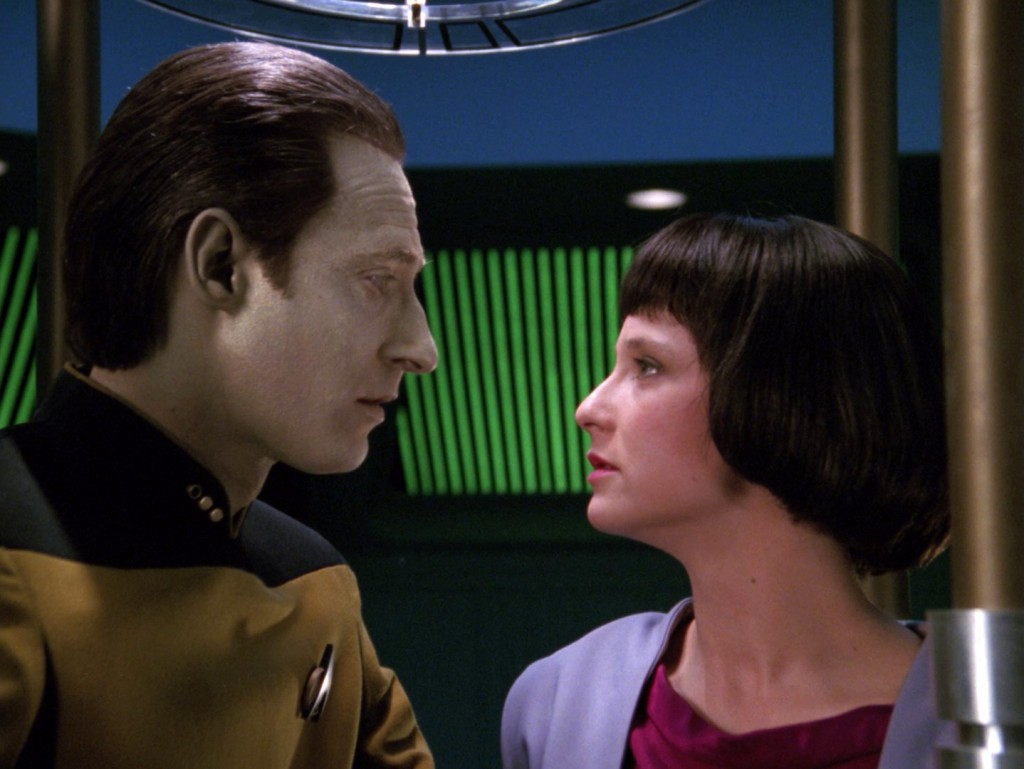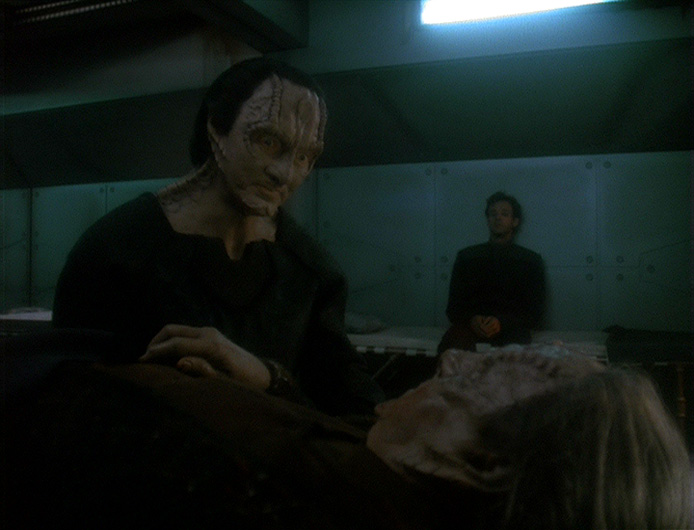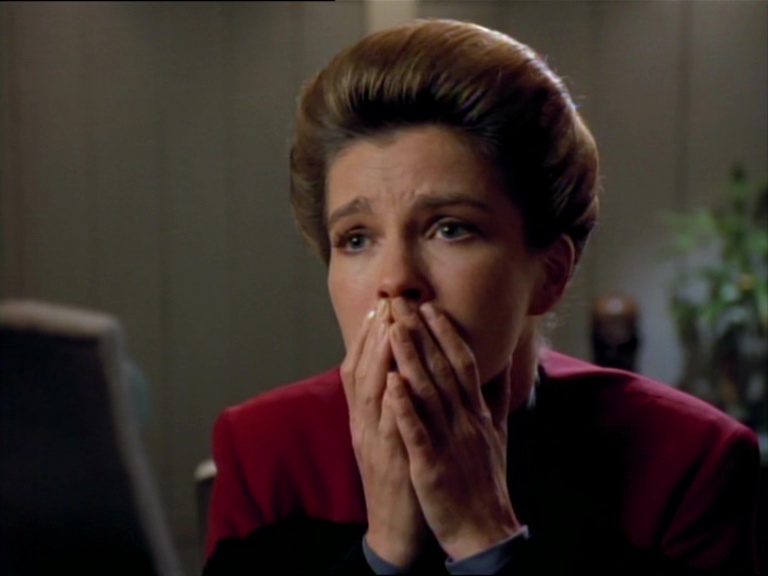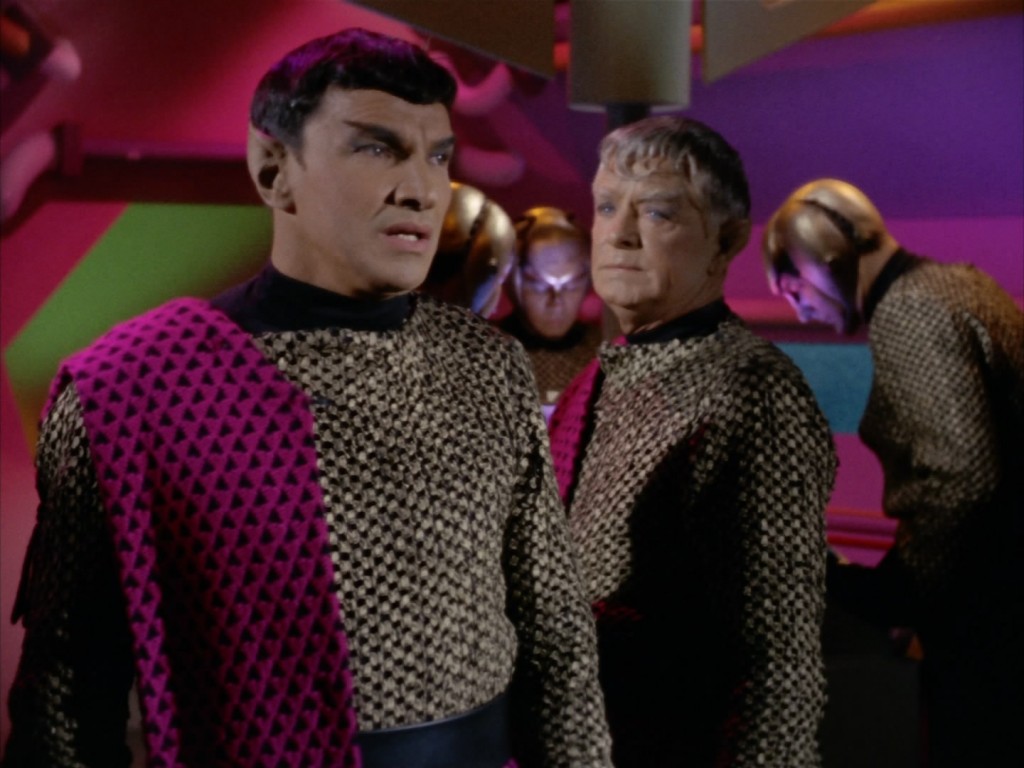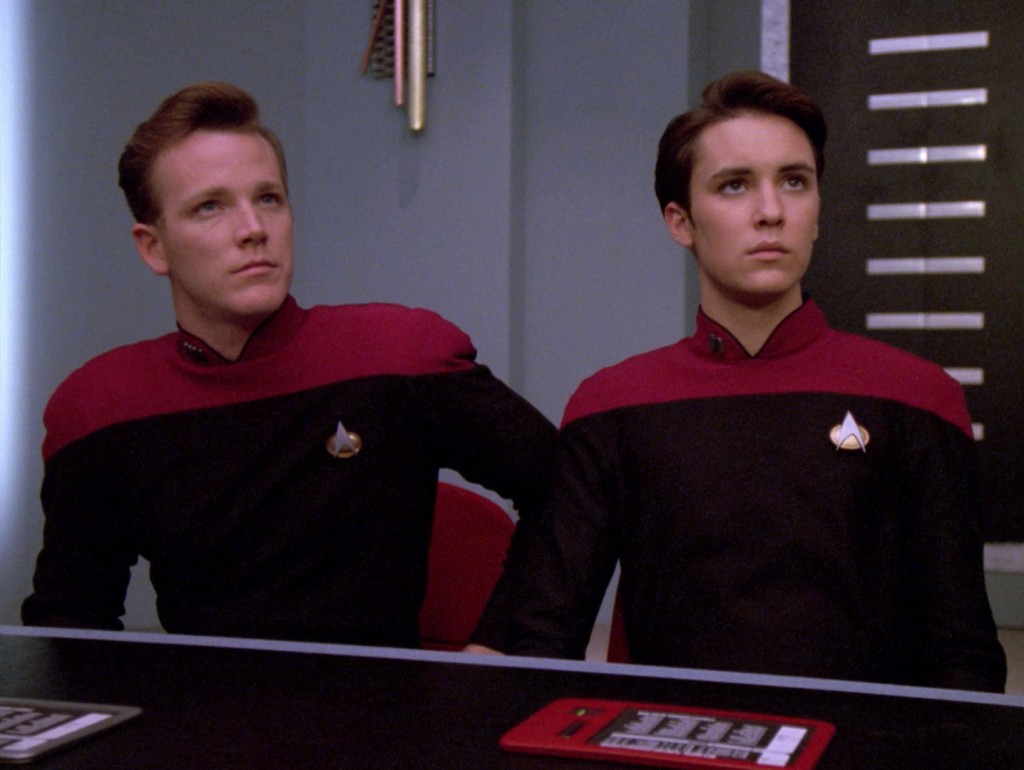On September 8th, 2016, the Star Trek franchise will officially turn 50, and what better way to celebrate than to count down the 50 greatest Star Trek stories in the canon? Deadshirt Founder and Editor Emeritus Dylan Roth pored through the 728 episodes and films to select the Top 50 Star Trek Voyages.
#25: “The Offspring”
Star Trek: The Next Generation
Season Three, Episode Sixteen
Originally aired March 12th, 1990
Written by René Echevarria
Directed by Jonathan Frakes
After Captain Picard, Commander Data is easily the most famous character from The Next Generation. He’s an Android, created by a human, who can do just about anything a human can do only better and faster, except feel. He was programmed without emotions, he says, and the audience is told over and over again that Data doesn’t have feelings. Except he absolutely does. Data may not smile or laugh, or scream or cry, but he has attachments. He has a sense of curiosity, of duty, pride, or shame. Data’s feelings are just different from most people’s, but everyone in the galaxy says he doesn’t have them so he never questions it.
“The Offspring” is a perfect example of Data’s feelings on display, as he attempts to create a new sentient android like himself, who he refers to as his child. Her name is Lal (Hallie Todd), and while she begins with an adult body and a much higher base intelligence than a human child, she still needs to be raised, taught about life and how to socialize with others. Data dedicates himself to her development, and adamantly defends the premise that they are a family, not an experiment. As word of Lal’s existance gets around, Data becomes embroiled in a custody battle with Admiral Haftel (Nicholas Coster), who wants Lal to be raised and studied in a controlled environment, without her father. Data can come up with a hundred logical justifications as to why they should not be separated, but more than that, he is absolutely insistent—he cannot abandon his child. He would leave Starfleet and the Enterprise in a figurative heartbeat if it means keeping his family together. Sounds reasonably emotional.
On top of being an excellent character study of Data, “The Offspring” continues the thread of Android personhood, so famously begun in the previous season’s “The Measure of a Man.” (More on episode in a future installment.) “The Offspring” is very comfortable with the idea of machines creating machines, of examining the differences, if any, between how Data procreates and how the biological organisms do. There’s also some of Trek‘s typical alien fish-out-of-water humor, as Lal learns how to act among humanoids one step at a time. It’s a milestone for Trek as a production, being Jonathan Frakes’ directorial debut and René Echevarria’s first screenplay (both would become fixtures in and out of Star Trek). As a whole, however, “The Offspring” is all heart, one of the few TNG episodes that can and absolutely should make you cry.
#24: “In Purgatory’s Shadow“/”By Inferno’s Light” (DS9)
Star Trek: Deep Space Nine
Season Five, Episodes Fourteen & Fifteen
Originally aired February 10th & 16th, 1997
Written by Ira Steven Behr & Robert Hewitt Wolfe
Directed by Gabrielle Beaumont (pt. 1) & Les Landau (pt. 2)
This pivotal two-part episode was already the subject of a lengthy review in a previous installment of my Infinite Diversity column. In short, “In Purgatory’s Shadow”/”By Inferno Light” represents Deep Space Nine‘s ability to balance epic stories with galactic-level stakes with intriguing character work, particularly through the show’s finest supporting character, Elim Garak. And this isn’t the last we’ll be seeing of him in this countdown, either.
#23: “Prime Factors”
Star Trek: Voyager
Season One, Episode Ten
Originally Aired March 20th, 1995
Story by David R. George III & Eric A. Stillwell
Teleplay by Michael Perricone & Greg Elliot
Directed by Les Landau
The most frustrating thing about Voyager is in how often it fails to live up to the potential of its original premise—a Federation starship, stranded alone on the far side of the galaxy and populated not just by Starfleet officers but by Maquis rebels, must learn to work together despite their philosophical differences as they search for a way home. As the show progresses, each of the core conceits that separates Voyager from The Next Generation stop being important. There are precious few episodes that truly deliver on the promise of Voyager, while also telling the kind of compelling science fiction stories that have made Star Trek such a phenomenon, but as maligned as early Voyager tends to be in the eyes of fans and critics, there’s one early episode that simply knocks it out of the park.
In “Prime Factors,” Voyager is invited to visit Sikaris, a world whose culture is based on pleasure and hospitality. They’ve heard about Voyager’s tragic plight and want to offer them respite from their hard journey, and to hear their stories—Sikarins treasure stories. During their visit, Ensign Kim discovers that the Sikarins possess a technology that could conceivably take Voyager all the way home in a matter of minutes, but the Sikarins have a strict policy not to share their technology with foreign powers. That’s right, the Sikarins have their own Prime Directive.
While the Federation (and Voyager herself) have held high their standard of non-interference even when it can mean catastrophe for some less-developed society, the shoe’s on the other foot now. And try as she might to reach a diplomatic arrangement or exchange, Captain Janeway can’t get them to budge, and by Federation rules, that’s that—they’ll just have to move on. But not everyone on board agrees with Federation rules—the Maquis never signed up for this, and Maquis engineer Seska manages to convince shipmates from both crews to broker a secret deal to illegally acquire the technology.
But just recontextualizing well-established Trek dogma isn’t enough—the storytellers also take the opportunity to tell a second story, one that speaks to our own culture’s habit of treating real human causes like fads before forgetting about them and moving on to the next reason to throw a benefit concert. The Sikarins are well-meaning but they bore easily, and desire a constant flow of new stimulus. They manage to be a really critical look at American society without becoming cartoonish (compare to: the Ferengi).
“Prime Factors” utilizes each of Voyager’s unique series concepts—being lost and desperate, having a divided crew—to tell a very Star Trek story that would only work on this show. And even after rewatching much of what are considered Voyager’s peak years, this early episode stood out as the series’ most thought-provoking hour.
#22: “Balance of Terror”
Star Trek
Season One, Episode Eight
Originally aired December 15th, 1966
Written by Paul Schneider
Directed by Vincent McEveety
In modern television, we’re accustomed to seeing stories from multiple perspectives. (Imagine Game of Thrones if the story only followed House Stark.) But in 1966, the good guys were the good guys, the bad guys were the bad guys, and who really cares what the villain’s motivation is. All art is a reflection of its time, and during the height of the Cold War, most Americans were unconcerned with what life was like in the Soviet Union, only that they were the enemy and must be defeated.
“Balance of Terror” opens with the expected point of view—the Enterprise responds to the destruction of several outposts along the border shared with old enemies the Romulan Empire. Kirk and company must chase down a Romulan ship that has the ability to appear and disappear at will, leading to a tense submarine-style battle of feints and counter-moves. Kirk can’t help but develop a grudging respect for the opposing captain, who seems to equal his tactical skill.
About halfway into the episode, we begin to cut back and forth between the story unfolding on the Enterprise and a parallel one on the Romulan ship. Turns out the Romulan commander (Mark Lenard) isn’t much happier than Kirk is about committing an act of war, but he has his orders and his mission to carry out. As the episode plays out, it’s easy to root for both sides to somehow win out, for the bloodshed to end and for these two captains to meet in person and become friends. But, of course, it isn’t meant to be.
“Balance of Terror” also packs in commentary about racial prejudice, as well as an admittedly hamfisted subplot about two officers whose wedding is interrupted by the mission, and you can’t help but spend the entire episode waiting for one or the other of them to die. But on the whole, this is a classic episode that demonstrates exactly why The Original Series holds up so well.
#21: “The First Duty”
Star Trek: The Next Generation
Season Five, Episode Nineteen
Originally aired March 30th, 1992
Written by Ronald D. Moore & Naren Shankar
Directed by Paul Lynch
Fans of The Next Generation, especially those who watched from the beginning, will tell you: Wesley Crusher sucks. Time and again, this precocious teenage supergenius would manage to save the ship when a crew of Starfleet’s finest all fail to do so. He’s the original “Mary Sue,” an impossibly perfect self-insert character for Gene Roddenberry himself. So many bland episodes are dedicated to his coming of age and how freaking brilliant and perfect he is, enough that many viewers just checked out. So when Wesley left the ship (and the show) for Starfleet Academy, there was much rejoicing.
Now imagine the mood whiplash when the Enterprise pays Wesley a visit at the Academy (boo!) but he’s actually made a horrible mistake and could be in big trouble (yay?) “The First Duty” shows Wesley Crusher becoming a real character, with his naivety and entitlement finally catching up with him in the worst way. It doesn’t throw the character under the bus, it just presents him as a believable teenager for the first time. Wesley has spent his formative years in space among the greatest leaders and scientists the Federation has to offer. What happens when he’s taken out of that environment and instead surrounded by his peers, selfish irresponsible teens? Will he become one?
It seems like an awful thing to say, but Wesley’s growth of a character feels like a direct consequence of Gene Roddenberry’s death the previous year. No longer under the protection of the Great Bird, Wesley was finally allowed to do one of the most important things for a young person to do—make mistakes. Not just underperforming on an exam or whatever passed for a mistake earlier in his life, something that’s going to change him, to teach him something valuable about himself.
“The First Duty” is also notable for featuring the character of Nicholas Locarno, a charismatic but amoral Cadet played by Robert Duncan McNeill. McNeill would go on to play Tom Paris on Star Trek: Voyager, a very similar character who was also once in Starfleet before being discharged in disgrace. This is also the only actual appearance of Picard’s mentor Boothby (Ray Walston), the groundskeeper at Starfleet Academy. Boothby had been mentioned by Picard years earlier, and fake versions of Boothby would show up twice on Voyager, once as a hologram, and once as an alien imposter. Walston makes a significant impact with his very limited screen time in “The First Duty,” and despite getting very little explicit backstory, it’s easy to believe that Boothby had a profound impact on a young Jean-Luc Picard.
“The First Duty” has all of this, plus one of the best Picard speeches ever.
#20-16 Next Monday: Lots and lots of time travel, and a very sympathetic throw rug on wheels.

